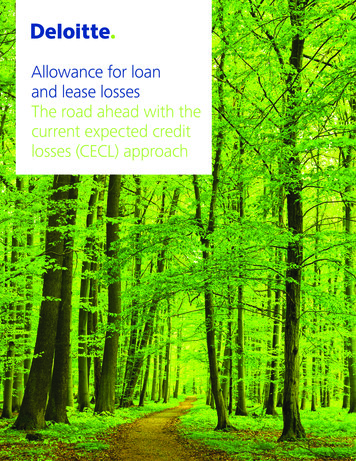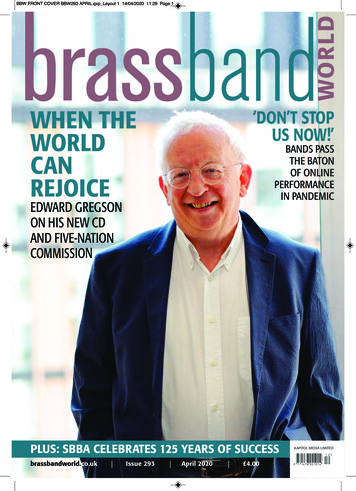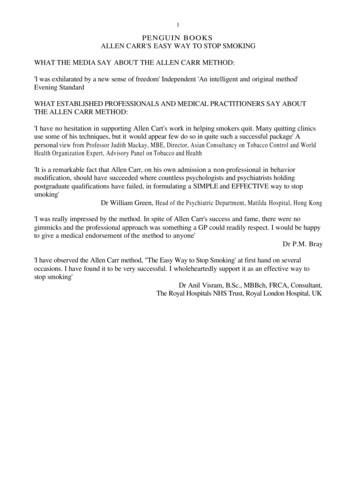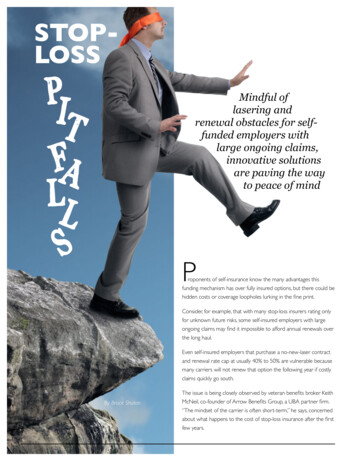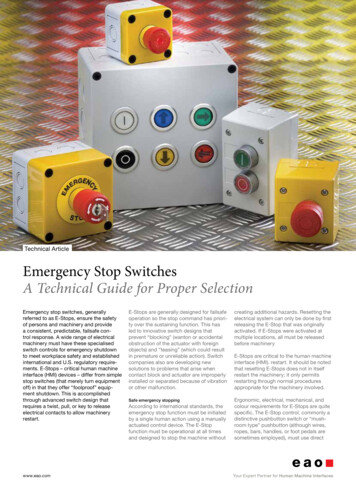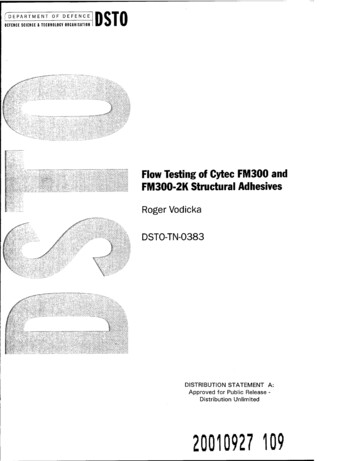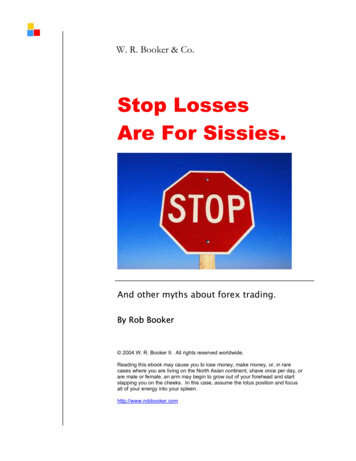
Transcription
W. R. Booker & Co.Stop LossesAre For Sissies.And other myths about forex trading.By Rob Booker 2004 W. R. Booker II. All rights reserved worldwide.Reading this ebook may cause you to lose money, make money, or, in rarecases where you are living on the North Asian continent, shave once per day, orare male or female, an arm may begin to grow out of your forehead and startslapping you on the cheeks. In this case, assume the lotus position and focusall of your energy into your spleen.http://www.robbooker.com
STOPS – page 2The Almighty Stop Loss.Stops matter more than almost anything else in trading. So few understand them.Some don’t even use them at all – mental or otherwise.The misunderstandings about stops contributes to more losses than just aboutanything else in trading. Think about your philosophy on stops. Do you have one?Can you articulate it?I’m willing to bet that 99% of traders do not have written stop loss rules.
STOPS – page 3Right next to what’s left of this beautiful apartment building in the Marina district is astop sign. Right next to my first emptied and blown out account was a disregardedstop sign. So many of them. I ignored a lot of them.This ebook is about stops and using them correctly. It’s about destroying some of themyths surrounding stop loss orders. It’s about helping to make you a better trader.I enjoy receiving your emails. If you have comments or stories about stop losses, orabout your trading, let me know. I’d love to hear from you. I try to respond to everyemail I receive – it might take me a few days even with the number of emails I receive,but I still try to reply.Myth 1: There is a Magic RatioI know that a zillion people are going to write me and criticize what I’m about to say.Let me say up front: if you read to the end of the ebook, we talk about what a smartratio includes. I’m not against ratios per se. I’m just against “holy grail” ratios.I think the illustration below captures the thought. People will tell you, on messageboards and in courses and on the Web and in videos and in books that you have tohave a “certain” ratio – your average win has to be greater than your average loss. Isthis true? Is that really, really true?No! It’s a bunch of BS and it has caused moretraders than I can list to go broke trying to get 50pips for every 25 that they lose. Or 100 pips forevery 30 that they lose, because someone wastalking to them about having to have twice asmany pips on their wins as they have on theirlosses.You can’t just think about your stops in relationto your gains. You can’t cut off every trade justbecause it’s reached a point at which it equals50% of your average gain. That’s ridiculous.While it might be true that you’re doing reallywell if your average gain is bigger than youraverage loss, there is no – ever, ever ever – magicratio. It simply does not exist. It never has, and it cannot be proven to have existed.
STOPS – page 4What if your average loss is 50 pips and your average gain is 50 pips, but your win% is70%? Doesn’t the reliability of your system have something to do with it? What if yoursystem wins 68% of the time, and your average bet/trade size is 3% of your accountvalue? Can you see what I’m getting at? If you only think of trading in terms of youravg loss vs. your avg. gain, you’re not getting the entire picture.I think that most people who talk about ratios are implicitly telling you this. They’reassuming that your system is 50% profitable. I’ve even seen ratios where they “buildin” your bet size and your win% -- those are better ratios by far. But don’t becomeobsessed with finding a system that returns some magic ration of wins to losses. Youdon’t have to find that magic ratio. It doesn’t exist.And here’s the rule: You need to backtest your system. You need to know its averagewin and loss. You need to set an optimal bet size. But there is no magic ratio.Myth 2: You Don’t Need a Stop LossThink about it: what would your car look like if you took out the brakes? Hell, youdon’t need them! You can just take your foot off the gas when it’s time to slow down,right!People start to think that they should t ake out their stop loss because “Every time Ilose, I realize that the trade came back later and everythingworked out.” Well, you know why that is? Because wewere in the middle of a ranging market, where theprice jumps up and down – and they get lucky. Butwhat if the market stops ranging? What if it startstrending? In that case, if you don’t have a stop,the trend ceases to be your friend. It becomesyour worst enemy.My first trading account was comprised of 2,000that a friend gave me. He trusted me and hesaid, “Trade it. Lose it. It’s trading money, notscared money. If you lose it, it’s not a big deal.”He thought that by saying that, I would be morerelaxed. While there is some truth to that statement(scared money is rarely good trading money), it’s alsodangerous to say. Think about it. What do you think Idid when I bought the USD/CHF and it started to fall? Ithought, “The trade’s going to come back to me. It’s going to
STOPS – page 5start going up again.” I also thought:“This isn’t scared money. I’m going to stay in the trade no matter what.”Of course, staying in the trade lost me my first account. You could already see thatone coming, as soon as I mentioned it. If you hear someone say that you don’t need astop loss, then you’re hearing a maniac. Do you need a stop loss order? A specificorder in your trading platform? No. If you’re worried about your broker “fishing forstops” then you can just have a mental stop loss order. This is a point at which you, asa disciplined trader, manually close the trade. This is harder to do than just puttingthe order in your trading platform or telling your broker over the phone – but it stillworks better than hiding from your losses as they grow and grow.So here’s the rule: You must at least, at the very least, have a Stop Loss order in yourhead (that you obey no matter what), or in your trading platform, or given to yourbroker over the phone.Myth 3: My Broker Hunts for StopsIf your broker hunts for stops, then you need to change brokers. And please, don’tfall for the “every spike means my broker is hunting for stops” mentality. Having yourstop loss hit is part of trading. You have to build that into the plan. Orders are clearedout all the time by spikes. Do all the banks in the world conspire to hunt for stopstogether? Rarely. Does your broker? Perhaps. It’s possible.If you think that’s what happened to you, then complain about it. Raise some hell. Ifit happens to you again, do the same. If your stop gets plucked a third time, though,then tough luck for you. You should have switched brokers.I empathize with you if your stop keeps getting hit really close to where the tradeturns around and runs in your favor. But you can’t be complaining that “If my brokerwould stop hunting for stops, I would be a profitable trader.” If you think that theworld of currency brokers – all of them – are conspiring against you, then you’re in thewrong business. You have to build some slippage (reasonable, not excessive) intoyour trading plan. You have to account for the fact that sometimes your stop is goingto get hit unjustifiably and you’re going to have to make a call. But don’t becomeobsessed with a paranoid mentality about brokers hunting for stops. If every brokerhunted for stops, then they would go out of business (and plenty of them do). Thebest solution here is to find a better broker and then stick with them, warts and all. Nobroker is perfect. Some are better than others, of course, but none are perfect.
STOPS – page 6Myth 4: No Matter What I Do, I Lose.If you really believe this, here’s what you need to do:Take your wallet in your right hand,and then, with your left hand, grabsome gasoline and a match. If thisis too much to hold in your left hand,then use your foot to hold the match.Now pour the gasoline on yourwallet. Now light it on fire.You have to stop beating yourselfup. I’m not sure if you think thatself-affirmations (the power ofpositive thinking) is a load of crap ornot. Actually, I don’t really care.Well, I care about you personally,but I don’t care if you think thatpositive thinking works or not.Because it does.The mostsuccessful traders in the world don’tspend time thinking about whatstupid people they are, about howprone to lose they are, about howawful they are, about how they don’tdeserve to be successful.Theymight not spend time in the lotusposition thinking happy Zenthoughts, but they’re certainly notbending over and thinking abouthow much it’s going to hurt whenthe currency market gives them a swift kick in the backside.Why do I even mention this? Because I’ve worked 1 on 1 with over 150 traders aroundthe world, and I’ve seen that the pessimists – the negative thinkers – are the worsttraders. They don’t set stop losses. Then they do, but they set them in the wrongplace. Then they don’t again. It’s a vicious cycle. If you don’t want to think positivethoughts all the time, then please, at least don’t start thinking negative ones.Now, on the other hand, if you’re willing to experiment a bit, and try something thatworks, look up Louise Hay’s brilliant book, You Can Heal Your Life. Read it. Getmore books like it. Start thinking more of yourself.
STOPS – page 7Truth 1: People Who Lose Deserve It.This is true. I wrote an entire ebook about this, which you can get for free on myWeb site. But here’s something I think I failed to include in the ebook: if you losemoney in currency trading, you deserve to lose it. Currency trading has laws just likePhysics, Math, Biology, or any other Science. When you break the law, there is aconsequence. If you lost money, that’s a consequence. Every consequence ispreceded by some law.I really mean this. It’s true. You lost money when some natural law of trading isviolated. Most of the time, it’s because you don’t have a trading system in place – nowritten rules (see more on that below). Sometimes, it’s because you didn’t set anappropriate stop.When you start to take responsibility for your own losses, your trading improves.Truth 2: The Best Stops ArePart of An Entire Trading Plan.Can you imagine if McDonald’s didn’tprovide rigid instructions on cooking theirhamburgers?Do you know what wouldhappen to quality control?Uh, maybe that’s a bad example.people think McDonald’s is gross.A lot ofOkay, imagine it anyway: what if McDonald’sentire business strategy was:We’ll look for good opportunities, and thenwe’ll take them. No other rules, not about whatconstitutes a “good” opportunity. Not aboutwhat to put on the menu at individualrestaurants.Can you imagine how much worseMcDonald’s would be? No rules about howmuch to charge for food, no rules on whether
STOPS – page 8they should serve food at all (although this is actually a question I’ve had for sometime).Your trading is no different. If your trading plan can be summarized by the statementI’ll look for good opportunities, and then I’ll take them, then you’re going to win some,lose more, win a few, lose more. You’re not going to know why. You’re just going tolose or win sporadically.I have never met a successful trader – not once, anywhere – who had traded for morethan 1 year successfully – that did not have a plan. Meaning, he/she had a plan thatincluded:1.2.3.4.5.Rules for entries and exitsRules for taking profitRules for taking lossesRules for bet/trade sizeA description of the overall systemThis is more important than I can communicate through words, so I am nowsending ESP thoughts to your brain. Now do you feel how important I think it is?Your best stop is just a product and a decision that is part of an overall plan. Toooften, and I felt this as well when I first started, we think that we can just look forgood trade opportunities and take them. This usually ends up just being trades takenwhen the market moves real quick on the 1 or 5 minute chart. Stops end up as theafterthought, rather than the forethought.This is really super duper important: you have to think about, and decide upon,your stops ahead of time. Before you take the trade. You need to have a system inplace that tells you what your rules are for stops. Of course the rules can be flexible!Of course you can change your implementation of the rules as necessary! But you’vegot to at least have a tried and tested system in place as a starting point.Big Idea 1: Get a Plan.Start today. If you don’t have a plan, and don’t know where to start, get a mentorthat can help you get a plan. You can even buy some books on trading and start towork on your plan. It doesn’t have to be fancy. It just has to be well-thought out.Until you get a plan in place, you’re going to feel anxious about your trades. Infact, even after you get a plan, you’re going to feel anxious for a while, during the timethat you learn to follow the plan and not go outside the boundaries of safe trades.
STOPS – page 9Here are some resources that you can read on the Web about putting a plantogether, or at least they’re interesting to read and they drive home some of the pointsfrom this ebook:Ed Seykota’s Money Management PageI have some philosophical arguments on some of Ed’s thinking, but I can’t arguewith his success. Read this Web e Original Trading TurtlesDon’t settle for substitutes. Get the original m Trading StrategiesThis is a nice list. You need to develop your own strategy, but this is a nice placeto tegies/index.htmlThat’s about it. You can trade for a living. You don’t have to be smarter thananyone else, or go to Wall Street, or have a huge trading account. You just need to bedetermined, disciplined, and have a plan.
STOPS – page 10About RobBoxer, Paratrooper, and general angry young man, RobBooker was one of the radical new voices that made the'Golden A
the order in your trading platform or telling your broker over the phone – but it still works better than hiding from your losses as they grow and grow. So here’s the rule: You must at least, at the very least, have a Stop Loss order in your head (that you obey no matter what), or in your trading platform, or given to your broker over the phone. Myth 3: My Broker Hunts for Stops If your .
